
L3AGI
Open-source framework to make AI agents' team collaboration as effective as human collaboration.
Stars: 199
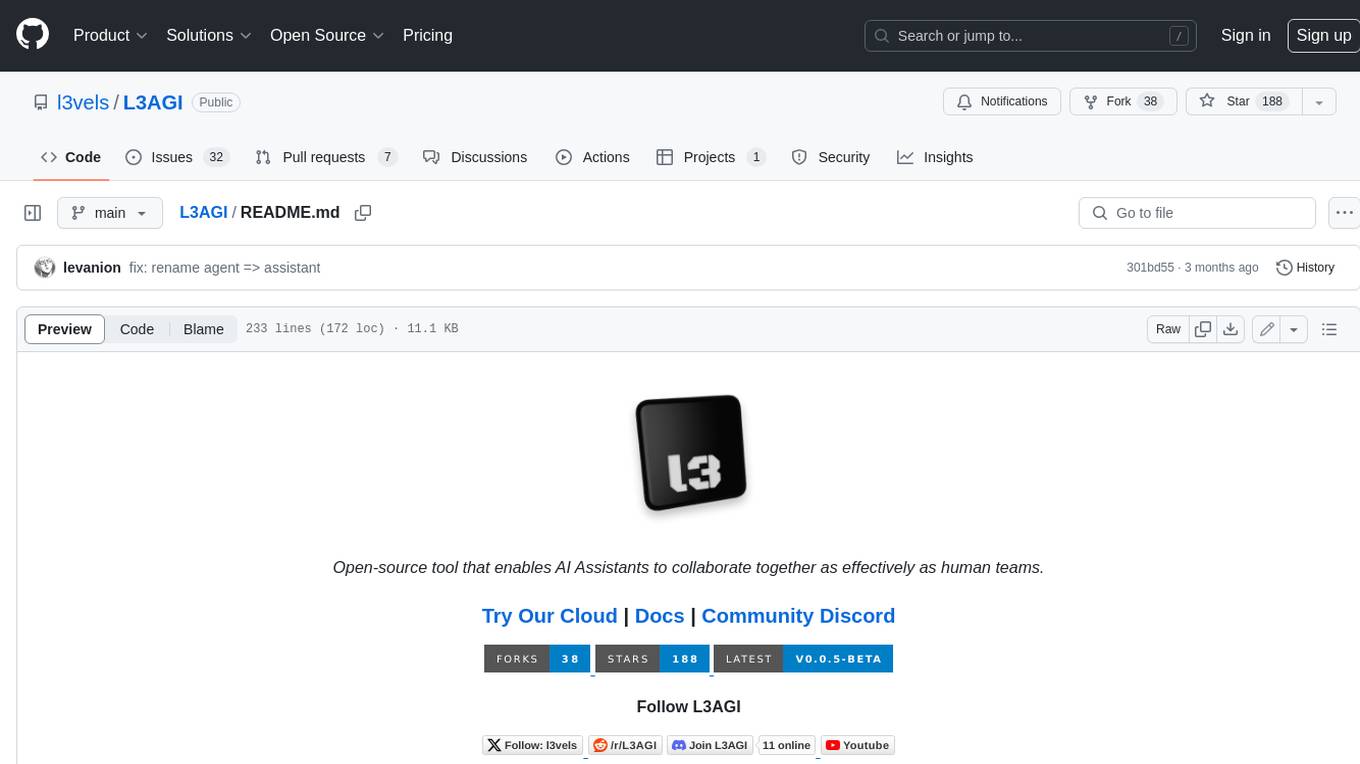
L3AGI is an open-source tool that enables AI Assistants to collaborate together as effectively as human teams. It provides a robust set of functionalities that empower users to design, supervise, and execute both autonomous AI Assistants and Teams of Assistants. Key features include the ability to create and manage Teams of AI Assistants, design and oversee standalone AI Assistants, equip AI Assistants with the ability to retain and recall information, connect AI Assistants to an array of data sources for efficient information retrieval and processing, and employ curated sets of tools for specific tasks. L3AGI also offers a user-friendly interface, APIs for integration with other systems, and a vibrant community for support and collaboration.
README:
Open-source tool that enables AI Assistants to collaborate together as effectively as human teams.
Follow L3AGI
Connect with the Creators
Of course! Here's the revised "Features" section with the requested emojis and in its entirety:

L3AGI offers a robust set of functionalities that empower you to design, supervise, and execute both autonomous AI Assistants and Teams of Assistants. Here's what sets us apart:
-
🤖 Team Of Assistants: L3AGI pioneers in facilitating the creation and management of Teams of AI Assistants. These are groups of individual AI Assistants that collaborate seamlessly for more complex tasks and simulations.
-
🔧 Autonomous AI Assistants: Design and oversee standalone AI Assistants that act autonomously based on their configuration.
-
🧠 Assistant Memory: Equip your AI Assistants with the ability to retain and recall information, enabling them to make more informed decisions.
-
🔗 Data Sources & Integration:
- Connect your AI Assistants to an array of data sources for efficient information retrieval and processing.
- Integrate VectorDBs for enhanced data management and querying capabilities.
- Employ the LlamaIndex (GPT Index) to boost the data framework for your LLM application.
 Postgres |
 Mysql |
 Files |
 WebPage |
 Notion |
 Google Analytics |
 Firebase |
- 🛠 Toolkits: Empower your AI Assistants with our curated sets of tools, tailor-made for specific tasks.
 SERP |
 Web Scraper |
 DuckDuckGo |
 Bing |
 Wikipedia |
 Arxiv |
OpenWeather |
 Charts |
 Twilio |
 |
 |
 Slack |
 Gmail |
 Google Calendar |
-
📊 Chart Generator: Turn your data into insightful visualizations with our intuitive chart generator.
-
📄 Report Generator: Streamline report creation with our user-friendly report generator tool.
-
🌐 Community Building: Engage with a dynamic community to collectively enhance and refine your AI Assistants.
-
🖥 User Interface (UI): Utilize our sleek, user-friendly interface for building and managing your AI Assistants and their teams.
-
📡 APIs: Robust APIs ensure smooth integration of L3AGI with other systems and support advanced customizations for your specific needs.
🚀 Roadmap here

- Docker 🐳
- Docker Compose
-
Clone the repository:
git clone https://github.com/l3vels/L3AGI.git
-
Navigate to the project directory:
cd L3AGI -
Setup Git Hooks
chmod +x setup.sh ./setup.sh
-
Create
.envfile from.env.exampleinapps/serverdirectory and configure- Configure
Azure Web PubSubusing our guide here
- Configure
-
Create
.envfile from.env.exampleinzepdirectory and configure -
🐳 Run Docker Compose:
docker-compose up --build
This will build and start both the React UI and FastAPI services.
-
React UI: Open
http://localhost:3000in your browser. -
FastAPI Server: Open
http://localhost:4000in your browser or API client.
.
├── apps/
│ ├── ui/ # React UI Application
│ └── server/ # Python FastAPI Server
└── docker-compose.yml # Main Docker Compose File
- If you encounter issues when starting the services, ensure Docker and Docker Compose are installed and up to date.
- Check the logs for any service-specific errors.
This initiative is currently in its developmental phase and might have some inconsistencies. We value your patience and comprehension. Should you face any challenges, kindly consult our list of existing issues first. If you can't find a relevant one, please open a new issue explaining the concern you faced. Your backing means a lot to us! Thank you!
For Tasks:
Click tags to check more tools for each tasksFor Jobs:
Alternative AI tools for L3AGI
Similar Open Source Tools

L3AGI
L3AGI is an open-source tool that enables AI Assistants to collaborate together as effectively as human teams. It provides a robust set of functionalities that empower users to design, supervise, and execute both autonomous AI Assistants and Teams of Assistants. Key features include the ability to create and manage Teams of AI Assistants, design and oversee standalone AI Assistants, equip AI Assistants with the ability to retain and recall information, connect AI Assistants to an array of data sources for efficient information retrieval and processing, and employ curated sets of tools for specific tasks. L3AGI also offers a user-friendly interface, APIs for integration with other systems, and a vibrant community for support and collaboration.
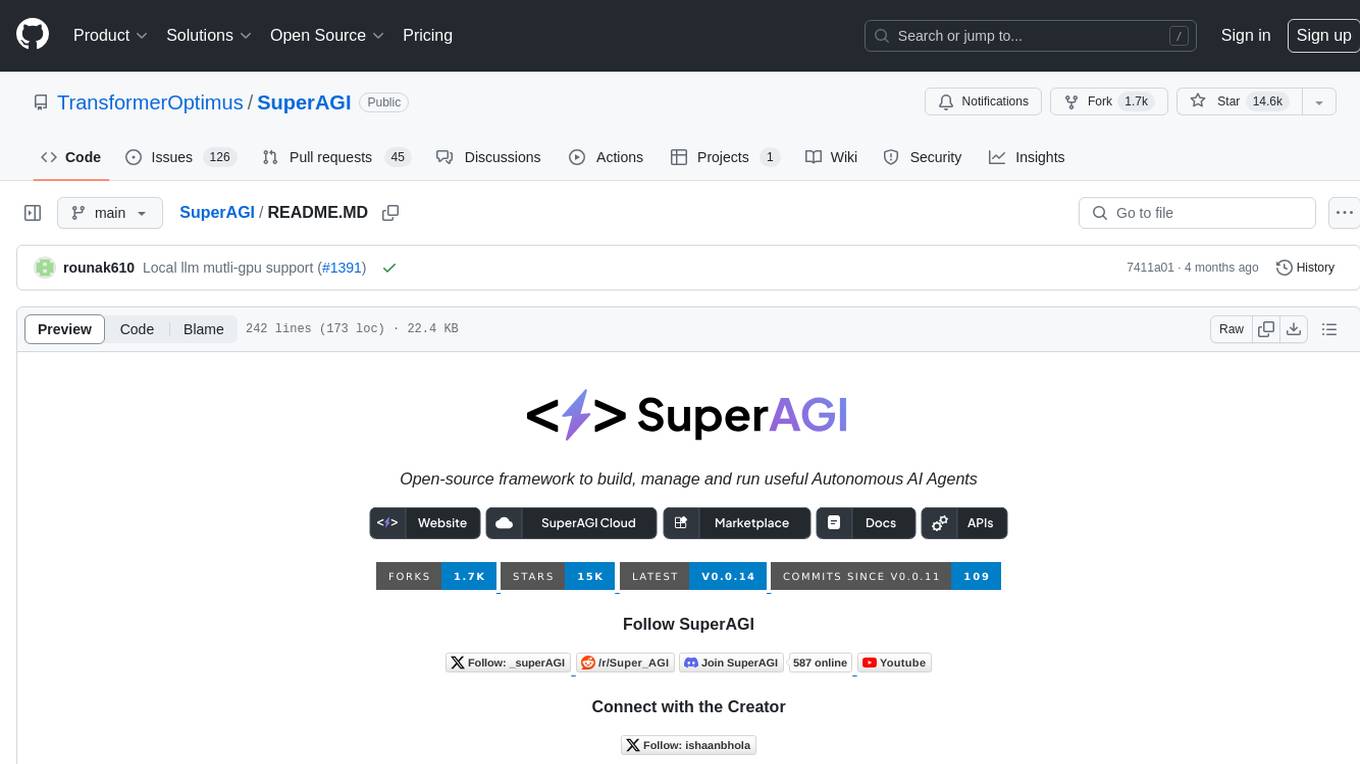
SuperAGI
SuperAGI is an open-source framework designed to build, manage, and run autonomous AI agents. It enables developers to create production-ready and scalable agents, extend agent capabilities with toolkits, and interact with agents through a graphical user interface. The framework allows users to connect to multiple Vector DBs, optimize token usage, store agent memory, utilize custom fine-tuned models, and automate tasks with predefined steps. SuperAGI also provides a marketplace for toolkits that enable agents to interact with external systems and third-party plugins.
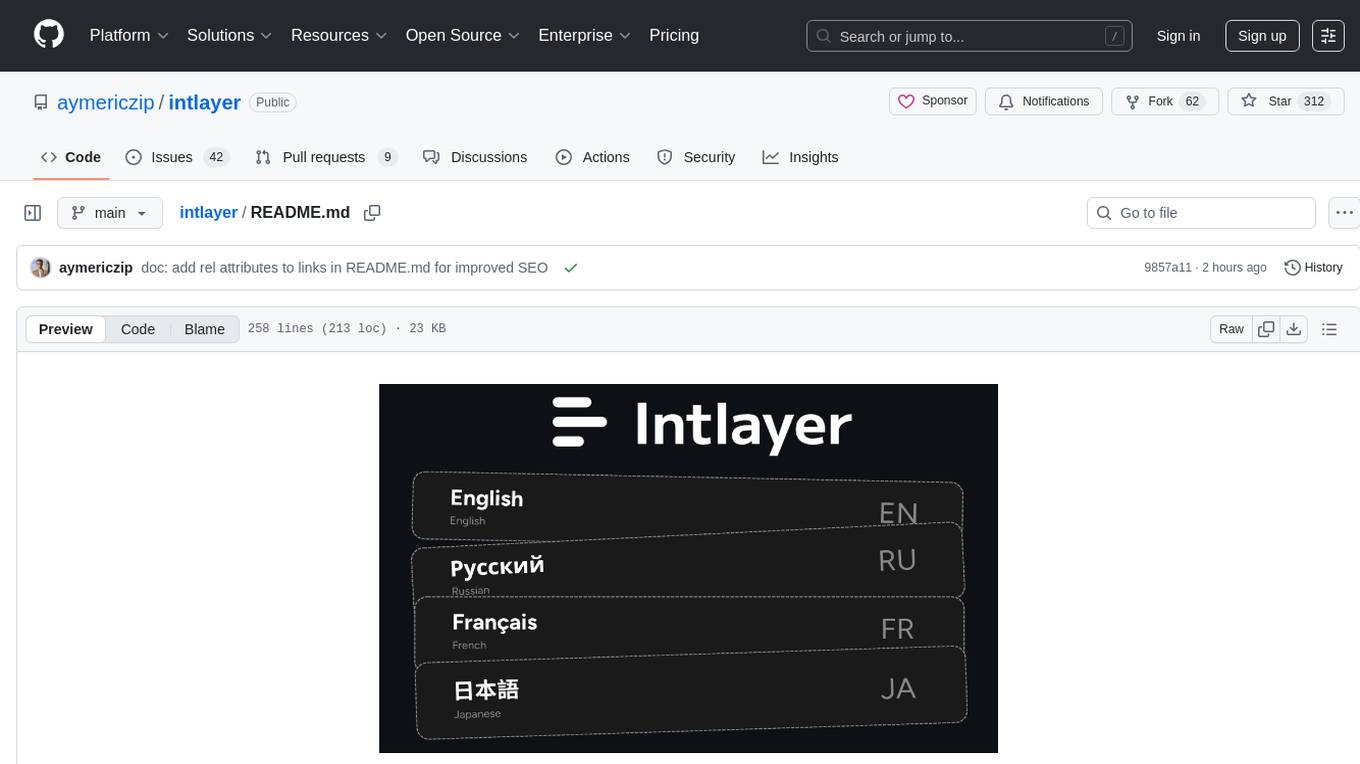
intlayer
Intlayer is an open-source, flexible i18n toolkit with AI-powered translation and CMS capabilities. It is a modern i18n solution for web and mobile apps, framework-agnostic, and includes features like per-locale content files, TypeScript autocompletion, tree-shakable dictionaries, and CI/CD integration. With Intlayer, internationalization becomes faster, cleaner, and smarter, offering benefits such as cross-framework support, JavaScript-powered content management, simplified setup, enhanced routing, AI-powered translation, and more.
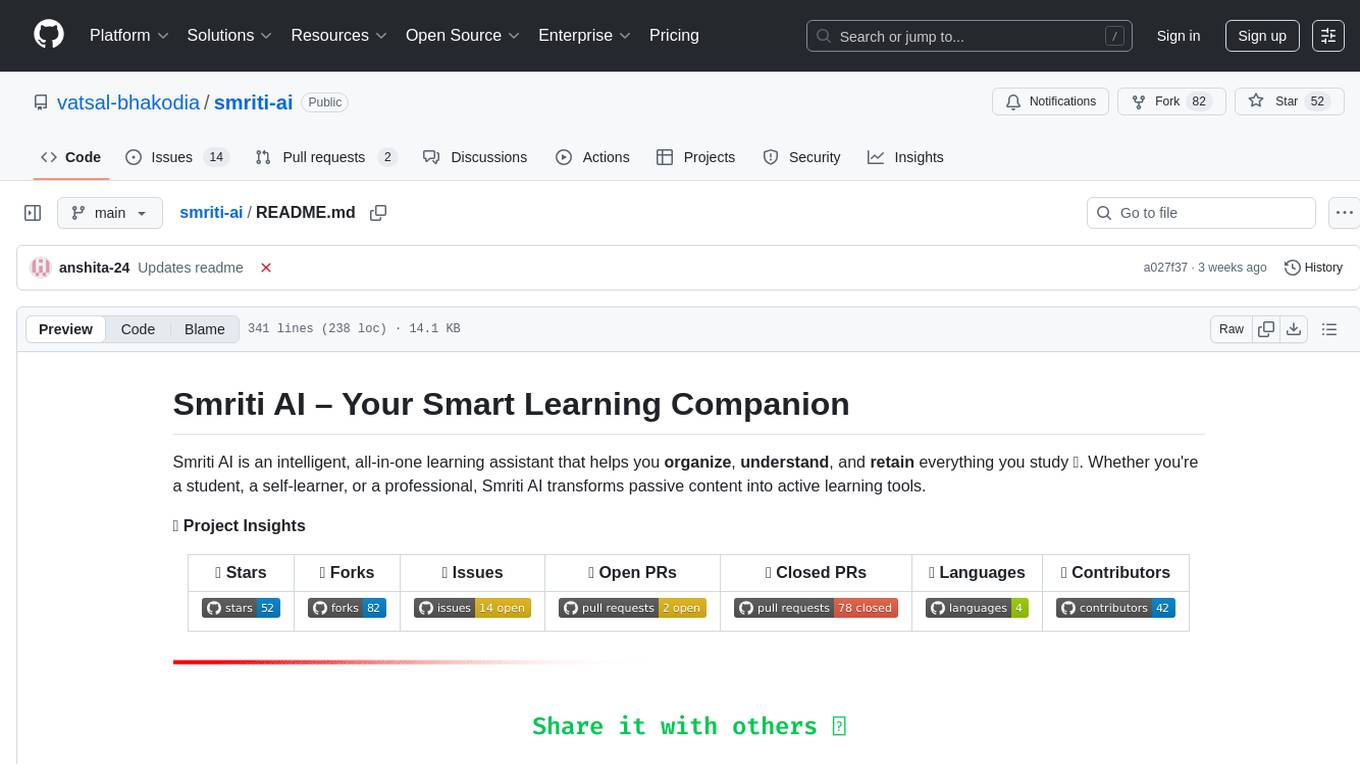
smriti-ai
Smriti AI is an intelligent learning assistant that helps users organize, understand, and retain study materials. It transforms passive content into active learning tools by capturing resources, converting them into summaries and quizzes, providing spaced revision with reminders, tracking progress, and offering a multimodal interface. Suitable for students, self-learners, professionals, educators, and coaching institutes.
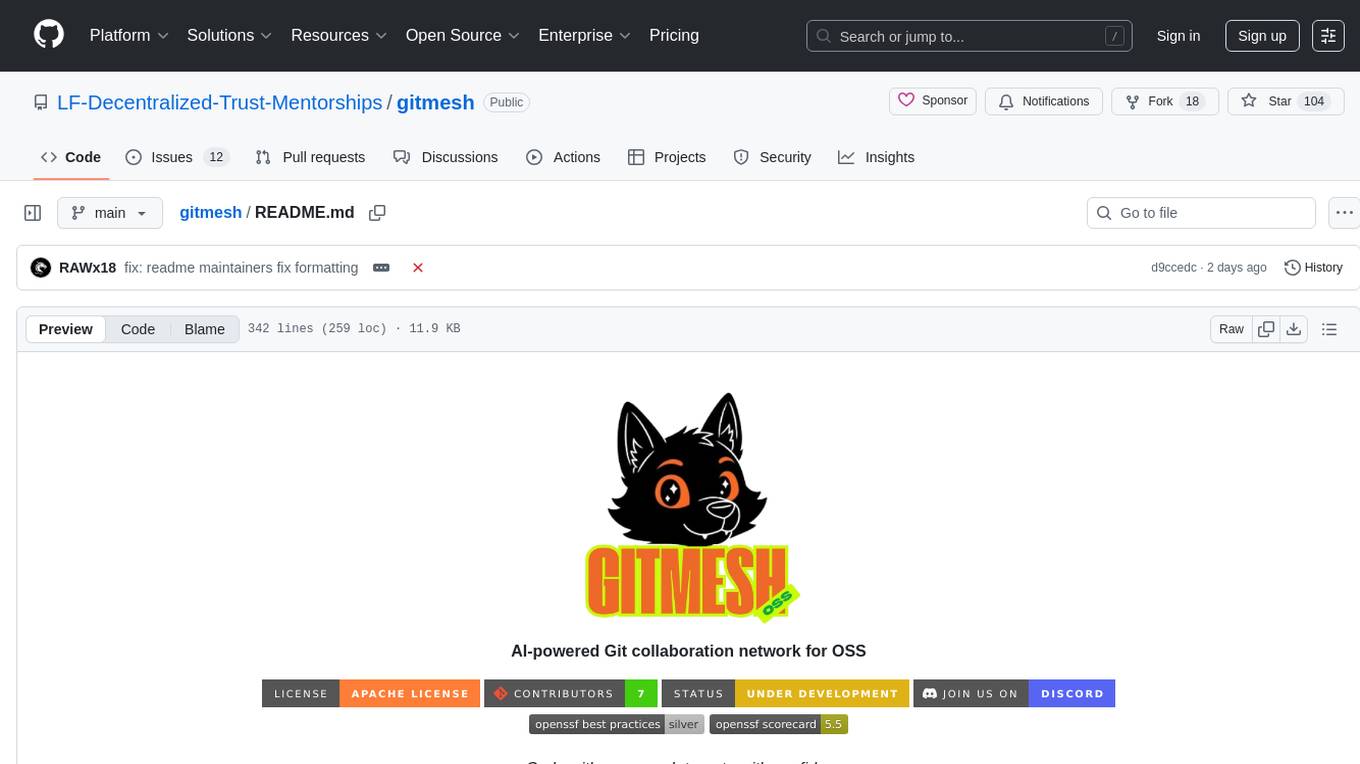
gitmesh
GitMesh is an AI-powered Git collaboration network designed to address contributor dropout in open source projects. It offers real-time branch-level insights, intelligent contributor-task matching, and automated workflows. The platform transforms complex codebases into clear contribution journeys, fostering engagement through gamified rewards and integration with open source support programs. GitMesh's mascot, Meshy/Mesh Wolf, symbolizes agility, resilience, and teamwork, reflecting the platform's ethos of efficiency and power through collaboration.
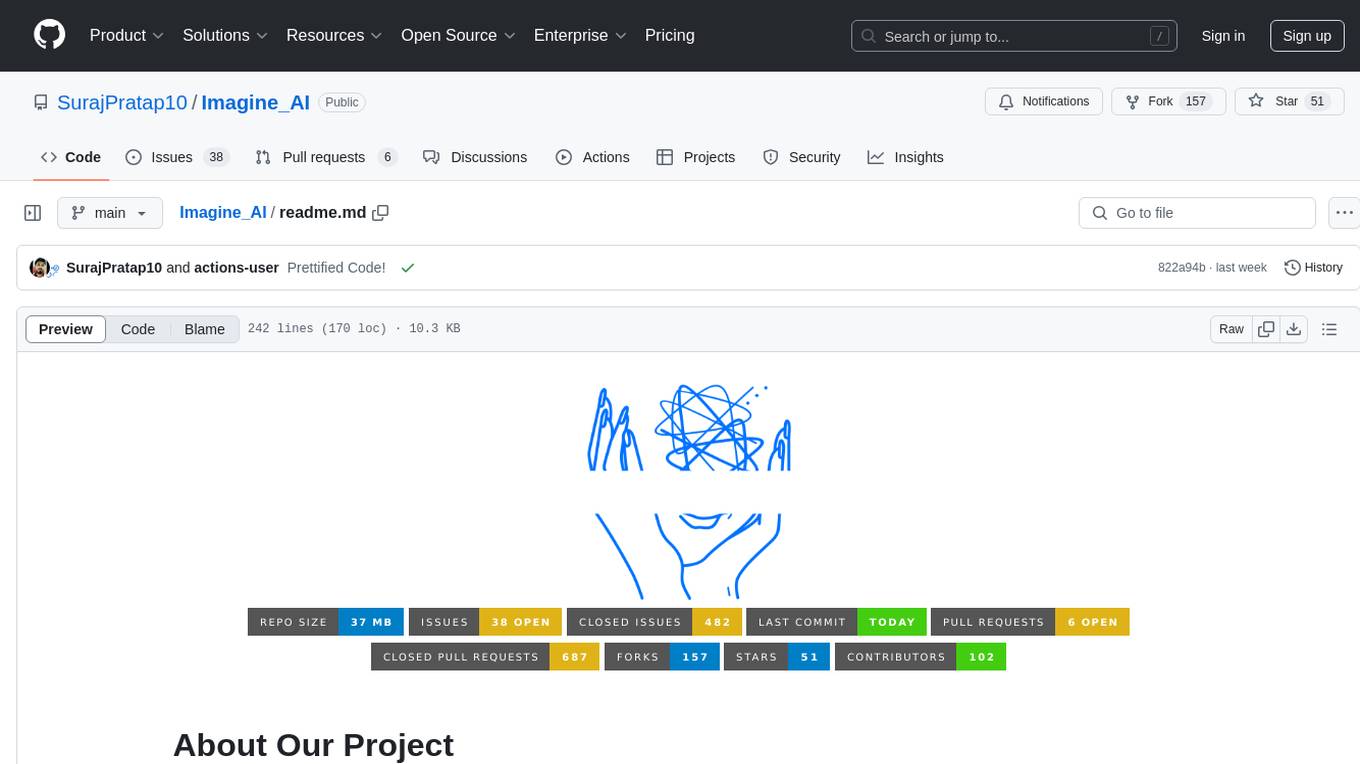
Imagine_AI
IMAGINE - AI is a groundbreaking image generator tool that leverages the power of OpenAI's DALL-E 2 API library to create extraordinary visuals. Developed using Node.js and Express, this tool offers a transformative way to unleash artistic creativity and imagination by generating unique and captivating images through simple prompts or keywords.
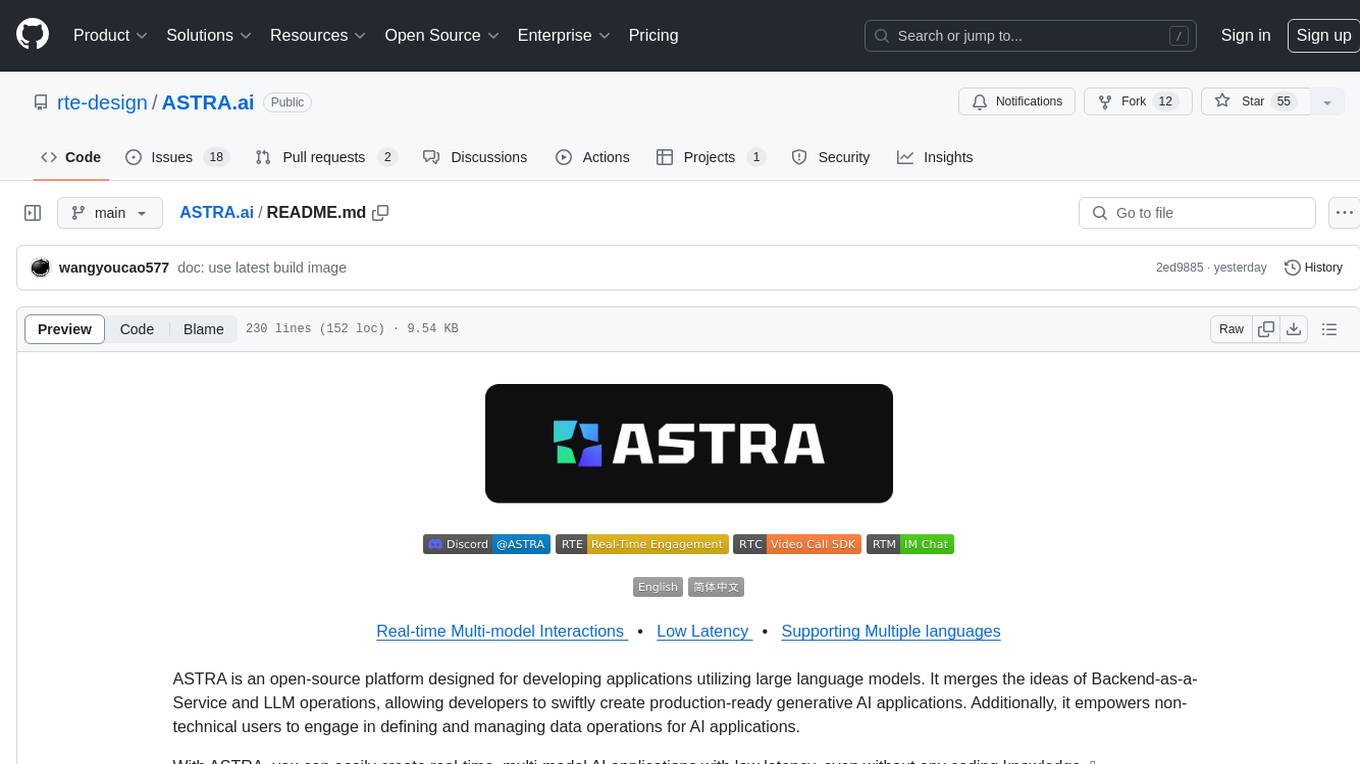
ASTRA.ai
ASTRA is an open-source platform designed for developing applications utilizing large language models. It merges the ideas of Backend-as-a-Service and LLM operations, allowing developers to swiftly create production-ready generative AI applications. Additionally, it empowers non-technical users to engage in defining and managing data operations for AI applications. With ASTRA, you can easily create real-time, multi-modal AI applications with low latency, even without any coding knowledge.
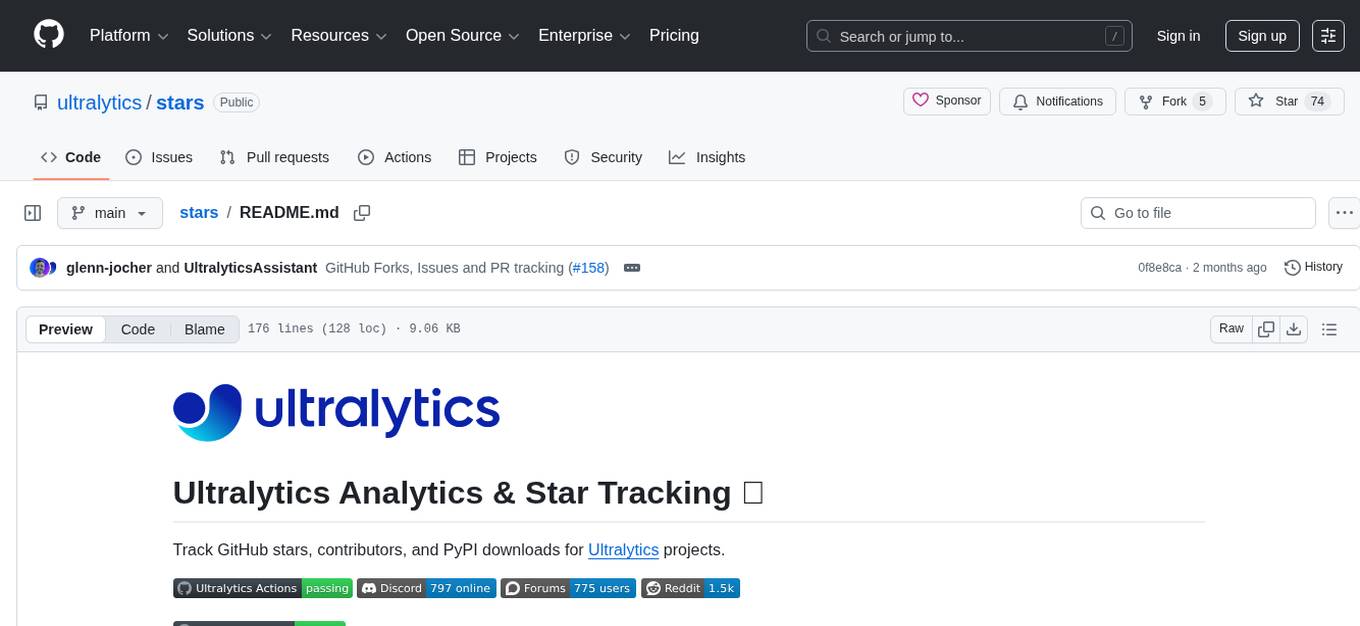
stars
Ultralytics Analytics & Star Tracking is a tool to track GitHub stars, contributors, and PyPI downloads for Ultralytics projects. It provides real-time analytics updated daily, including total stars, forks, issues, pull requests, contributors, and public repositories. Users can access the analytics API for GitHub and PyPI downloads. The tool also offers historical star tracking for GitHub repositories, allowing users to analyze star growth over time. With a REST API and Python usage examples, users can easily retrieve and display analytics data. The repository structure includes scripts for unified analytics fetching, historical star tracking, and shared utilities. Contributions to the open-source community are encouraged, and the tool is available under AGPL-3.0 License for collaboration and an Enterprise License for commercial applications.
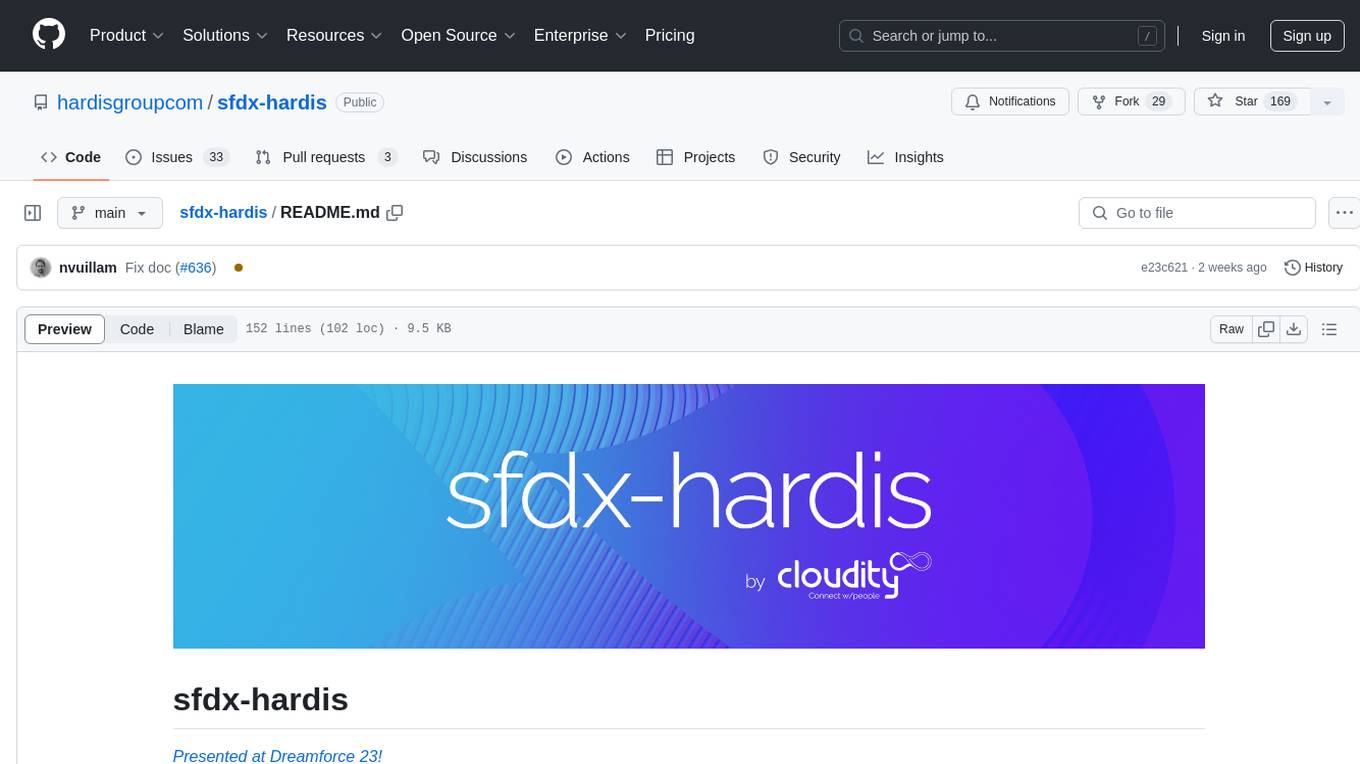
sfdx-hardis
sfdx-hardis is a toolbox for Salesforce DX, developed by Cloudity, that simplifies tasks which would otherwise take minutes or hours to complete manually. It enables users to define complete CI/CD pipelines for Salesforce projects, backup metadata, and monitor any Salesforce org. The tool offers a wide range of commands that can be accessed via the command line interface or through a Visual Studio Code extension. Additionally, sfdx-hardis provides Docker images for easy integration into CI workflows. The tool is designed to be natively compliant with various platforms and tools, making it a versatile solution for Salesforce developers.
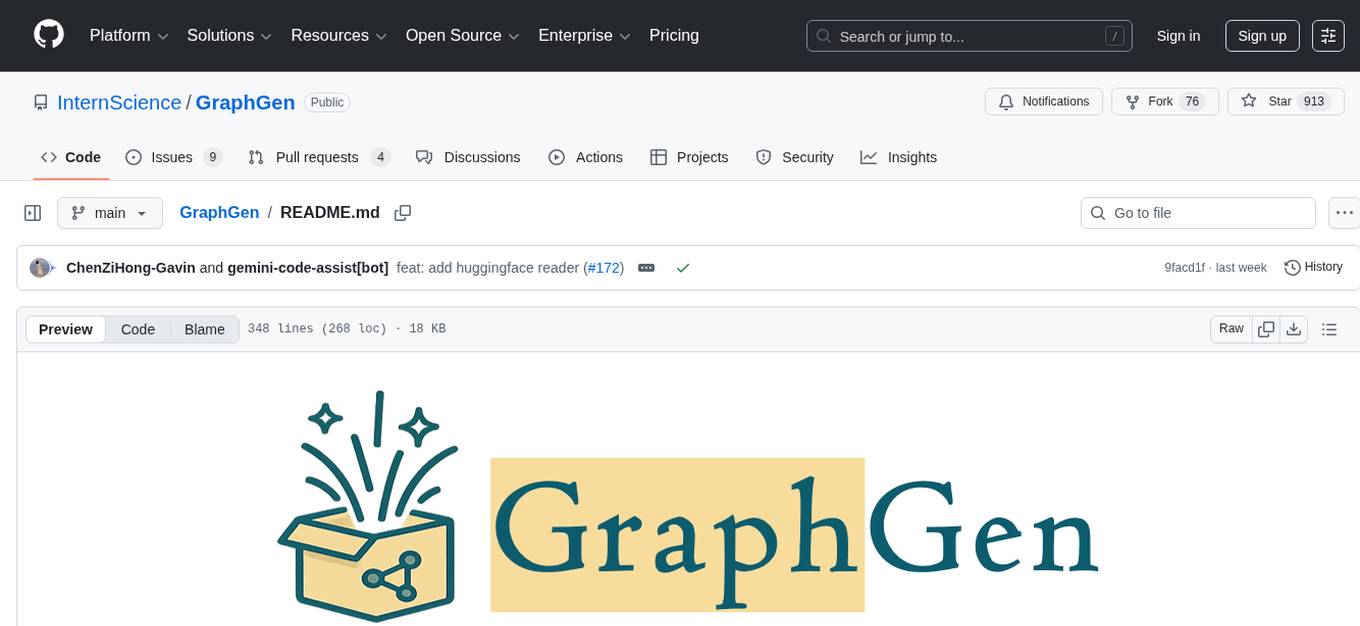
GraphGen
GraphGen is a framework for synthetic data generation guided by knowledge graphs. It enhances supervised fine-tuning for large language models (LLMs) by generating synthetic data based on a fine-grained knowledge graph. The tool identifies knowledge gaps in LLMs, prioritizes generating QA pairs targeting high-value knowledge, incorporates multi-hop neighborhood sampling, and employs style-controlled generation to diversify QA data. Users can use LLaMA-Factory and xtuner for fine-tuning LLMs after data generation.
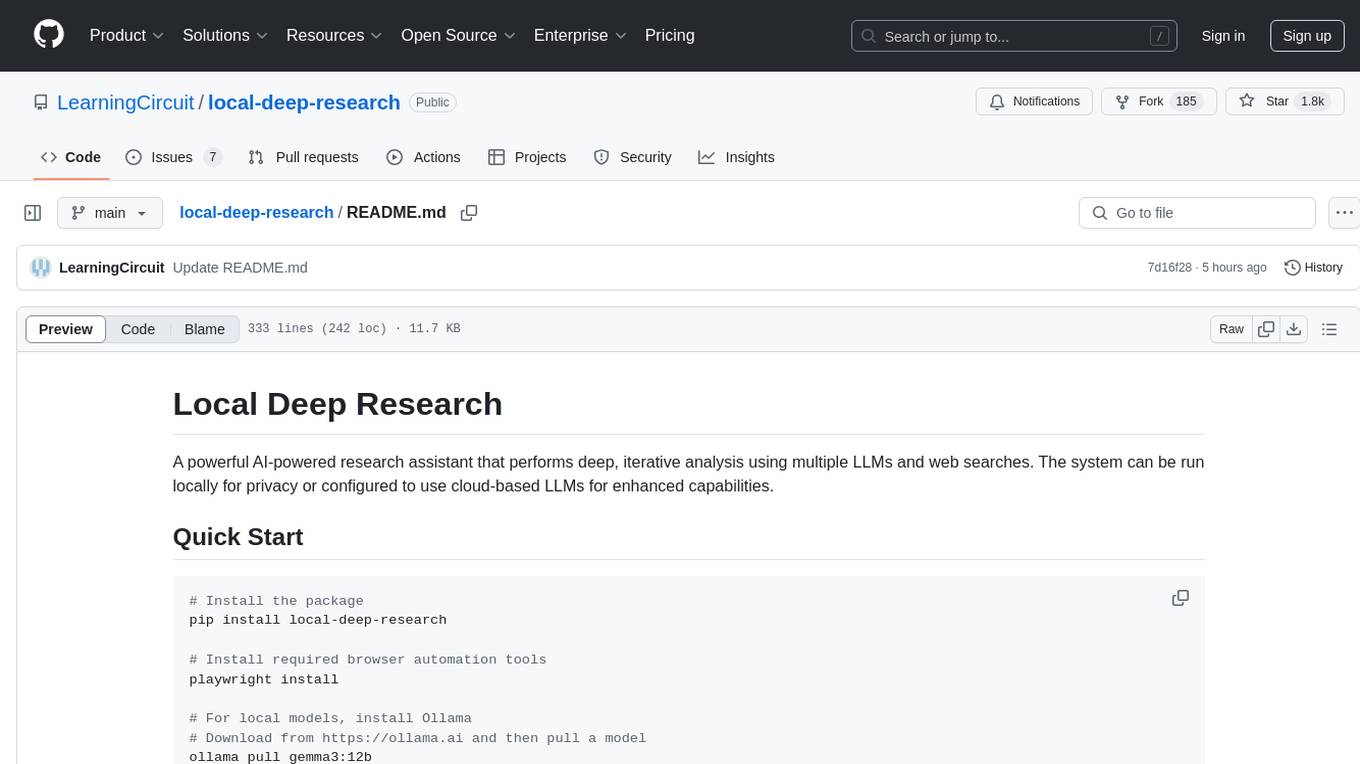
local-deep-research
Local Deep Research is a powerful AI-powered research assistant that performs deep, iterative analysis using multiple LLMs and web searches. It can be run locally for privacy or configured to use cloud-based LLMs for enhanced capabilities. The tool offers advanced research capabilities, flexible LLM support, rich output options, privacy-focused operation, enhanced search integration, and academic & scientific integration. It also provides a web interface, command line interface, and supports multiple LLM providers and search engines. Users can configure AI models, search engines, and research parameters for customized research experiences.
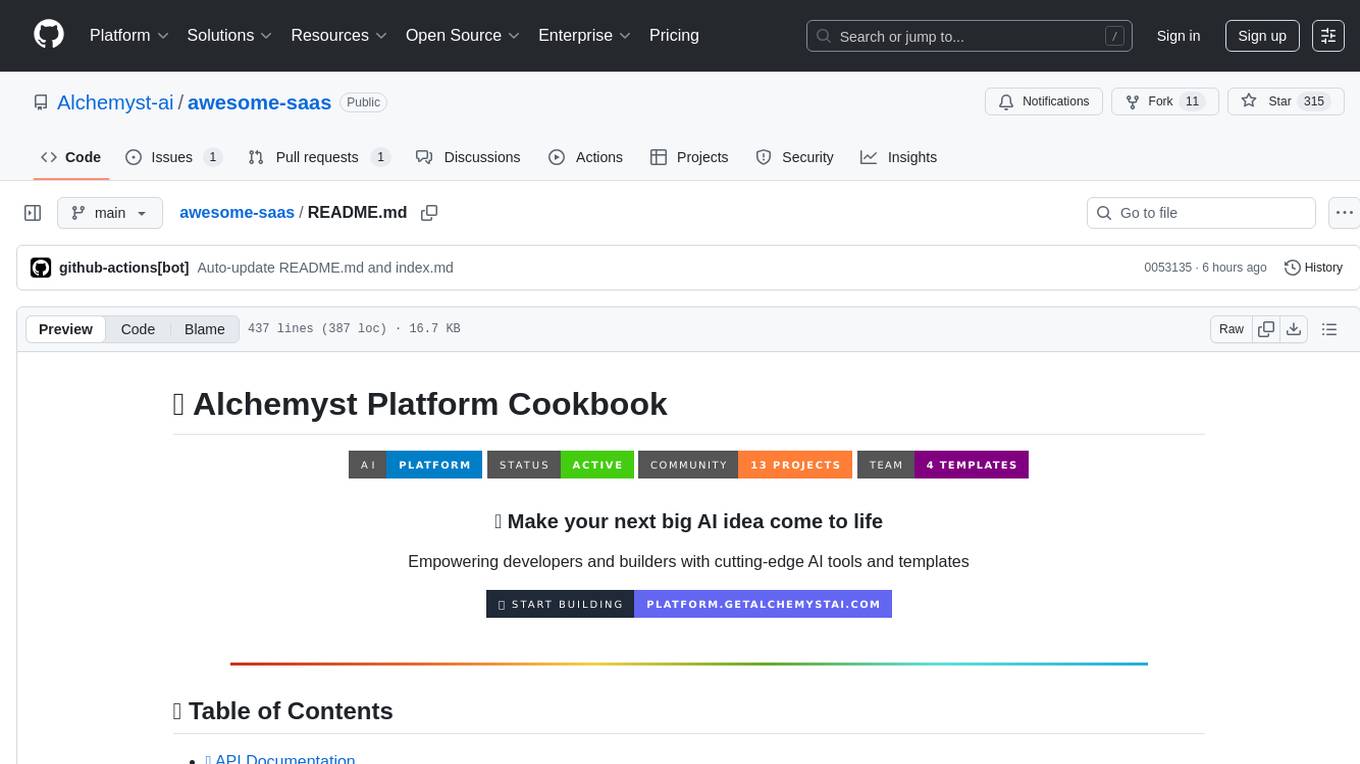
awesome-saas
The Alchemyst Platform Cookbook is a comprehensive guide for developers and builders to bring their AI ideas to life. It provides cutting-edge AI tools and templates to empower users in creating innovative projects. The platform offers API documentation, quick start guides, official and community templates for various projects. Users can contribute to the platform by forking the repository, adding the topic 'alchemyst-awesome-saas', making their repository public, and submitting a pull request. Troubleshooting guidelines are provided for contributors. The platform is actively maintained by the Alchemyst AI Team.
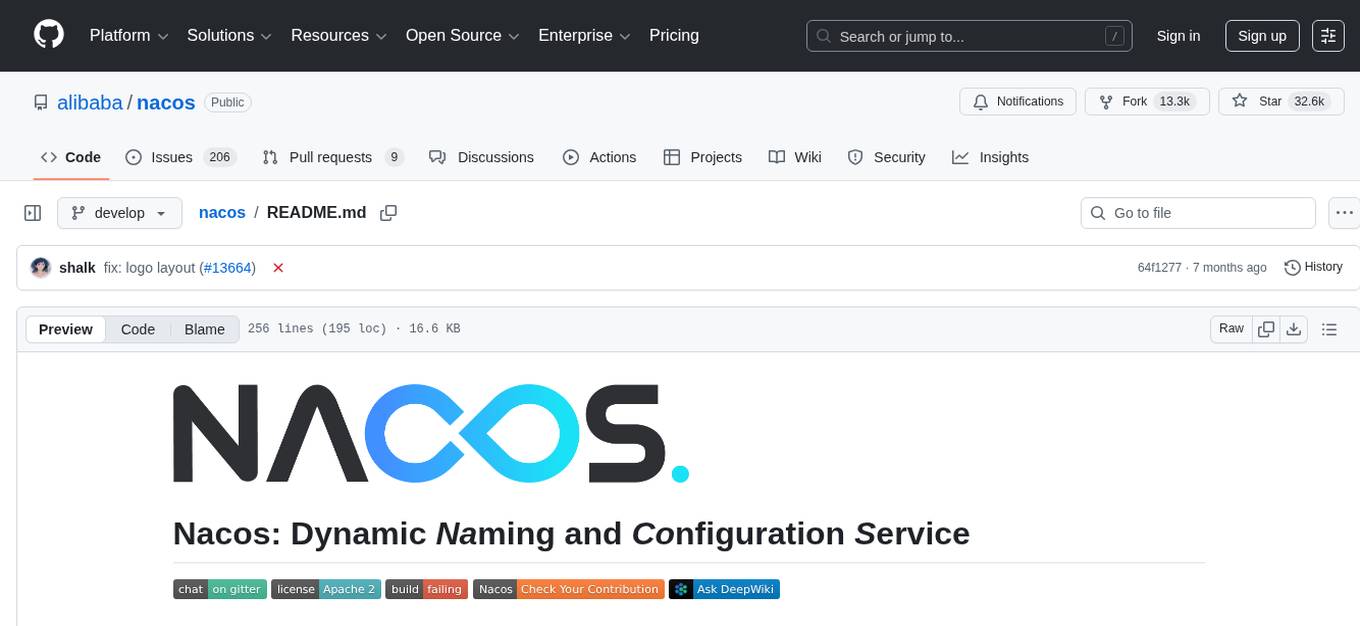
nacos
Nacos is an easy-to-use platform designed for dynamic service discovery and configuration and service management. It helps build cloud native applications and microservices platform easily. Nacos provides functions like service discovery, health check, dynamic configuration management, dynamic DNS service, and service metadata management.
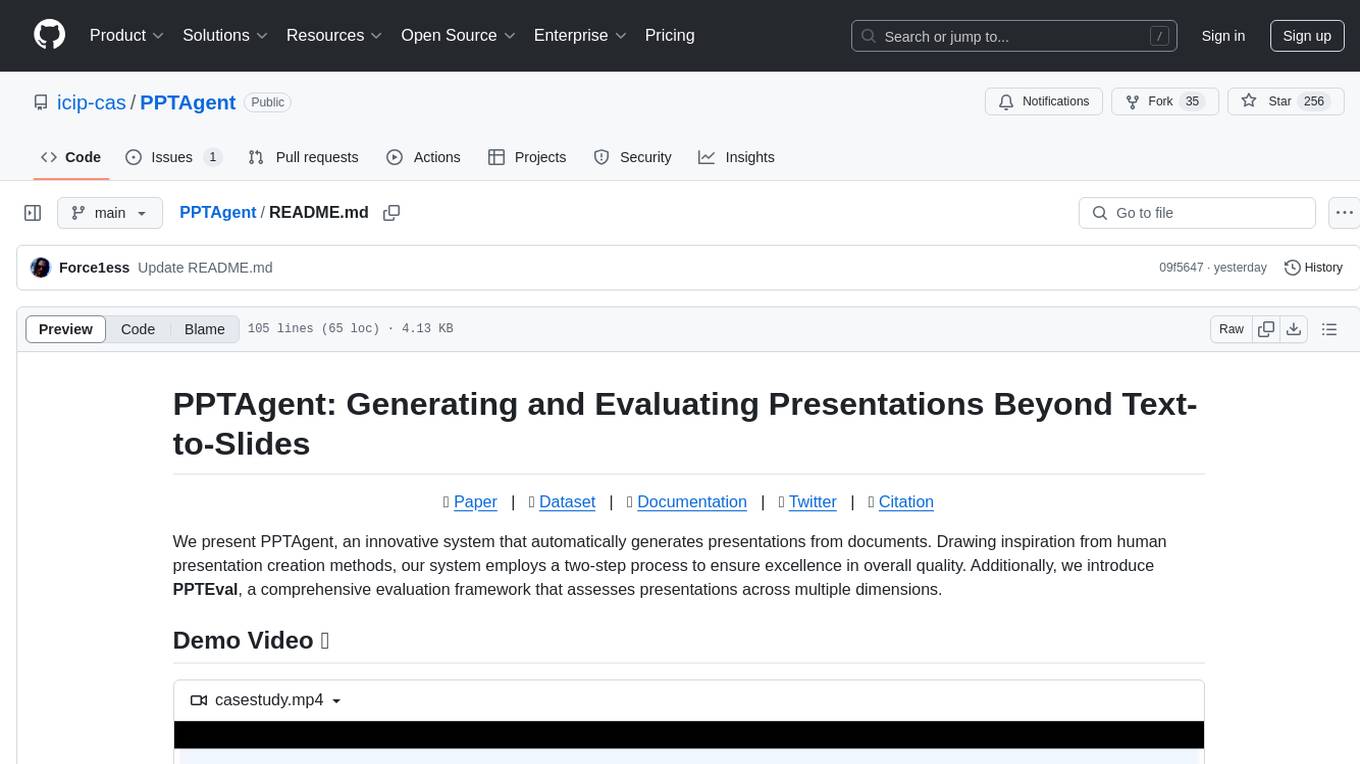
PPTAgent
PPTAgent is an innovative system that automatically generates presentations from documents. It employs a two-step process for quality assurance and introduces PPTEval for comprehensive evaluation. With dynamic content generation, smart reference learning, and quality assessment, PPTAgent aims to streamline presentation creation. The tool follows an analysis phase to learn from reference presentations and a generation phase to develop structured outlines and cohesive slides. PPTEval evaluates presentations based on content accuracy, visual appeal, and logical coherence.
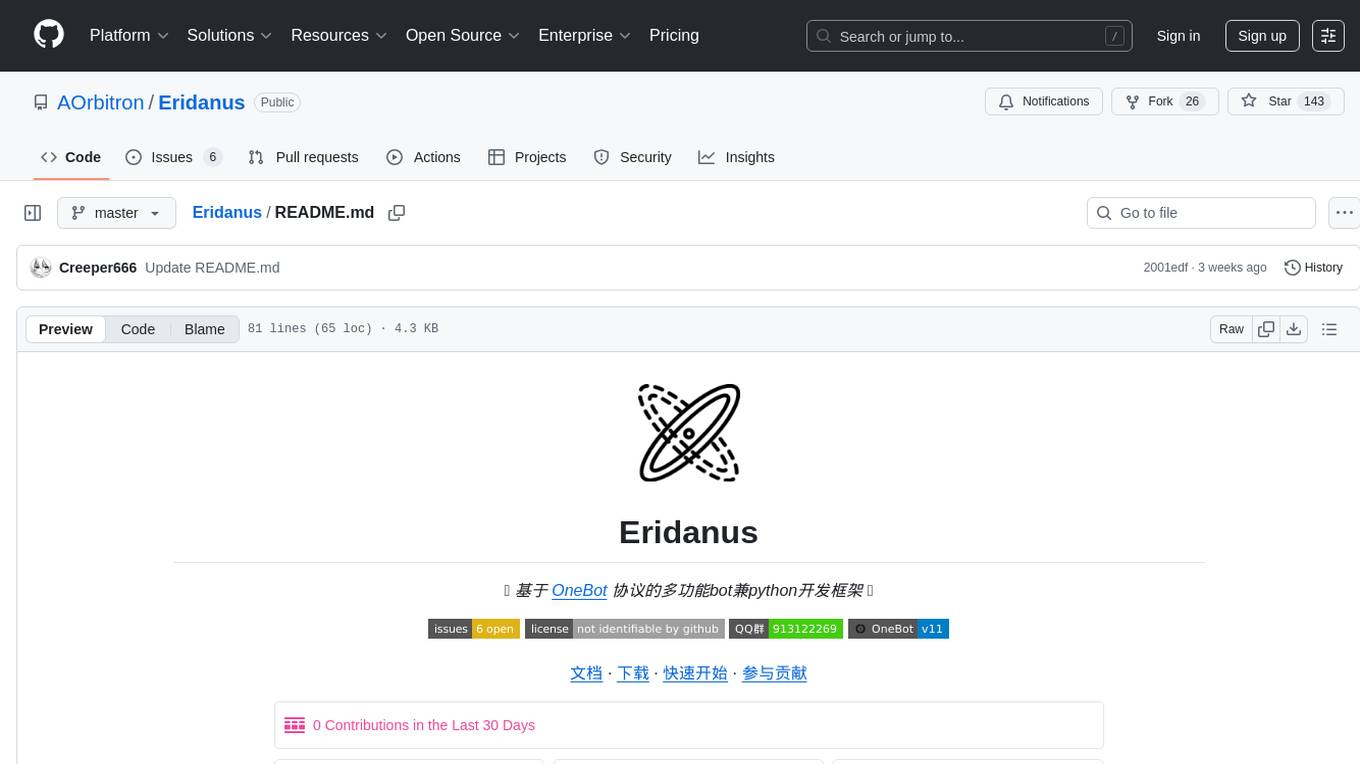
Eridanus
Eridanus is a powerful data visualization tool designed to help users create interactive and insightful visualizations from their datasets. With a user-friendly interface and a wide range of customization options, Eridanus makes it easy for users to explore and analyze their data in a meaningful way. Whether you are a data scientist, business analyst, or student, Eridanus provides the tools you need to communicate your findings effectively and make data-driven decisions.
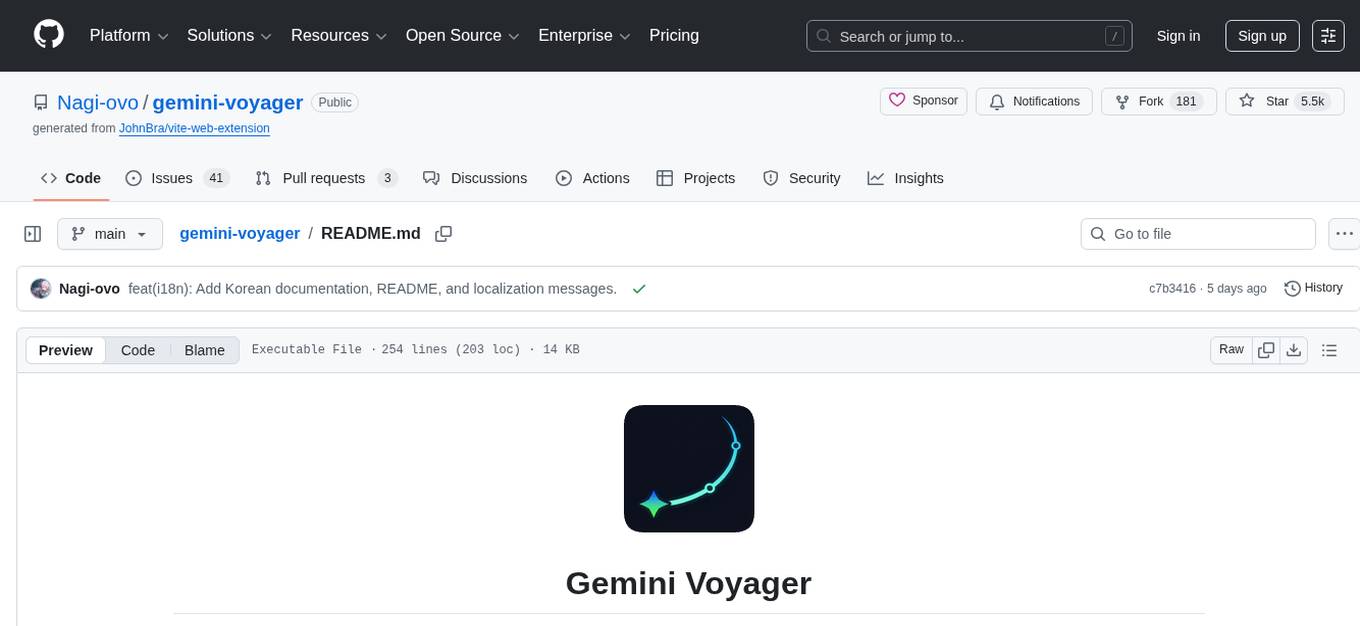
gemini-voyager
Gemini Voyager is a browser extension designed to enhance the user experience of Google Gemini by providing features such as folder organization, prompt vault, cloud sync, timeline navigation, chat export, Mermaid rendering, markdown fixing, and various power tools. It aims to help users keep their AI conversations organized, accessible, and productive. The extension is available on multiple browsers and supports manual installation and development builds. Users can also support the project by buying the developer a coffee or sponsoring via different platforms.
For similar tasks

L3AGI
L3AGI is an open-source tool that enables AI Assistants to collaborate together as effectively as human teams. It provides a robust set of functionalities that empower users to design, supervise, and execute both autonomous AI Assistants and Teams of Assistants. Key features include the ability to create and manage Teams of AI Assistants, design and oversee standalone AI Assistants, equip AI Assistants with the ability to retain and recall information, connect AI Assistants to an array of data sources for efficient information retrieval and processing, and employ curated sets of tools for specific tasks. L3AGI also offers a user-friendly interface, APIs for integration with other systems, and a vibrant community for support and collaboration.
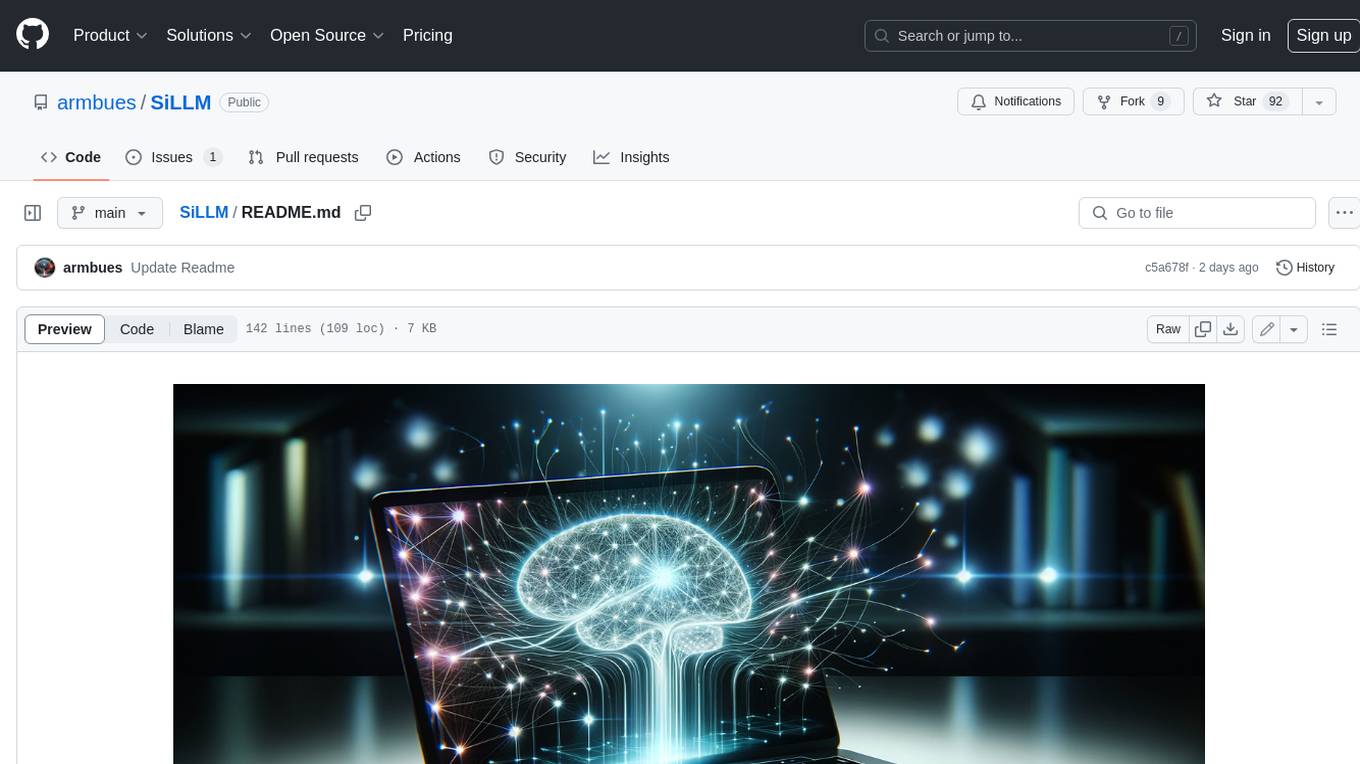
SiLLM
SiLLM is a toolkit that simplifies the process of training and running Large Language Models (LLMs) on Apple Silicon by leveraging the MLX framework. It provides features such as LLM loading, LoRA training, DPO training, a web app for a seamless chat experience, an API server with OpenAI compatible chat endpoints, and command-line interface (CLI) scripts for chat, server, LoRA fine-tuning, DPO fine-tuning, conversion, and quantization.
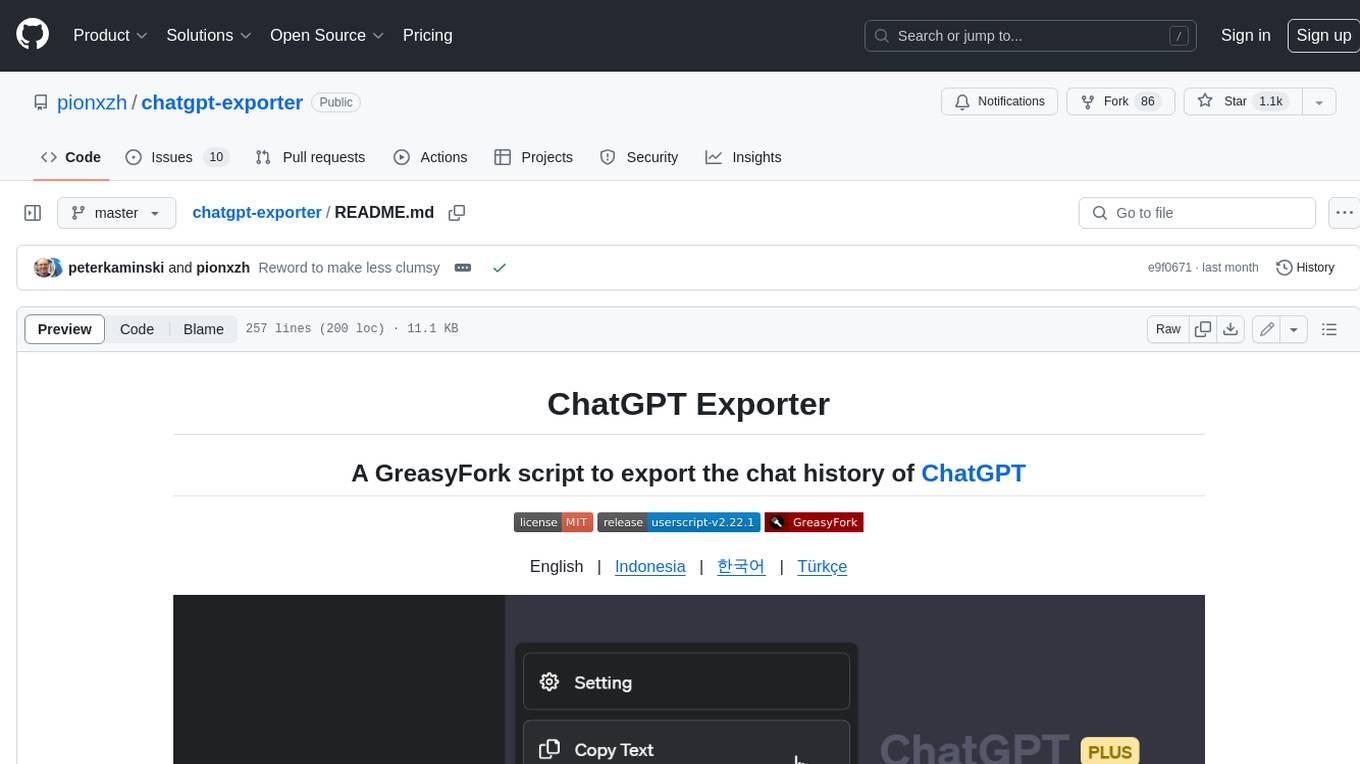
chatgpt-exporter
A script to export the chat history of ChatGPT. Supports exporting to text, HTML, Markdown, PNG, and JSON formats. Also allows for exporting multiple conversations at once.

kairon
Kairon is an open-source conversational digital transformation platform that helps build LLM-based digital assistants at scale. It provides a no-coding web interface for adapting, training, testing, and maintaining AI assistants. Kairon focuses on pre-processing data for chatbots, including question augmentation, knowledge graph generation, and post-processing metrics. It offers end-to-end lifecycle management, low-code/no-code interface, secure script injection, telemetry monitoring, chat client designer, analytics module, and real-time struggle analytics. Kairon is suitable for teams and individuals looking for an easy interface to create, train, test, and deploy digital assistants.
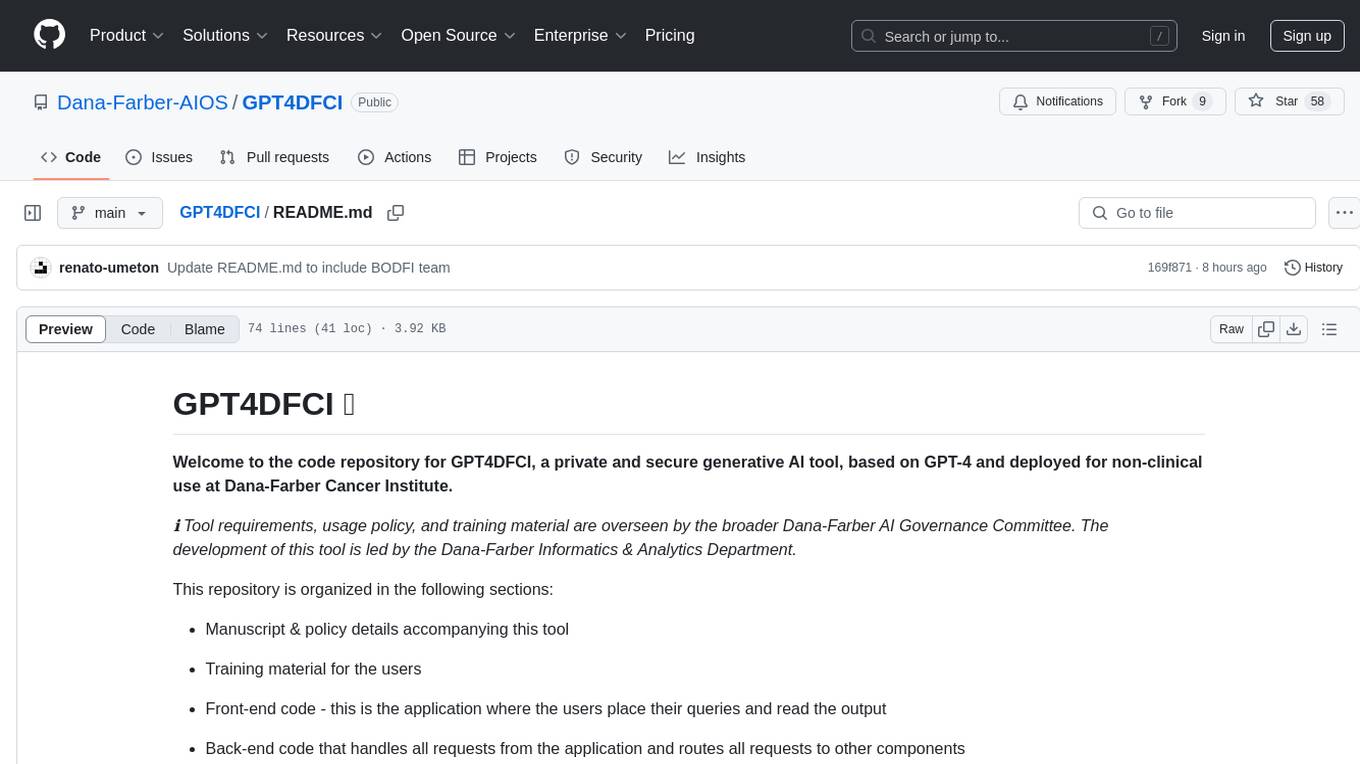
GPT4DFCI
GPT4DFCI is a private and secure generative AI tool based on GPT-4, deployed for non-clinical use at Dana-Farber Cancer Institute. The tool is overseen by the Dana-Farber AI Governance Committee and developed by the Dana-Farber Informatics & Analytics Department. The repository includes manuscript & policy details, training material, front-end and back-end code, infrastructure information, API client for programmatic use, licensing details, and contact information.
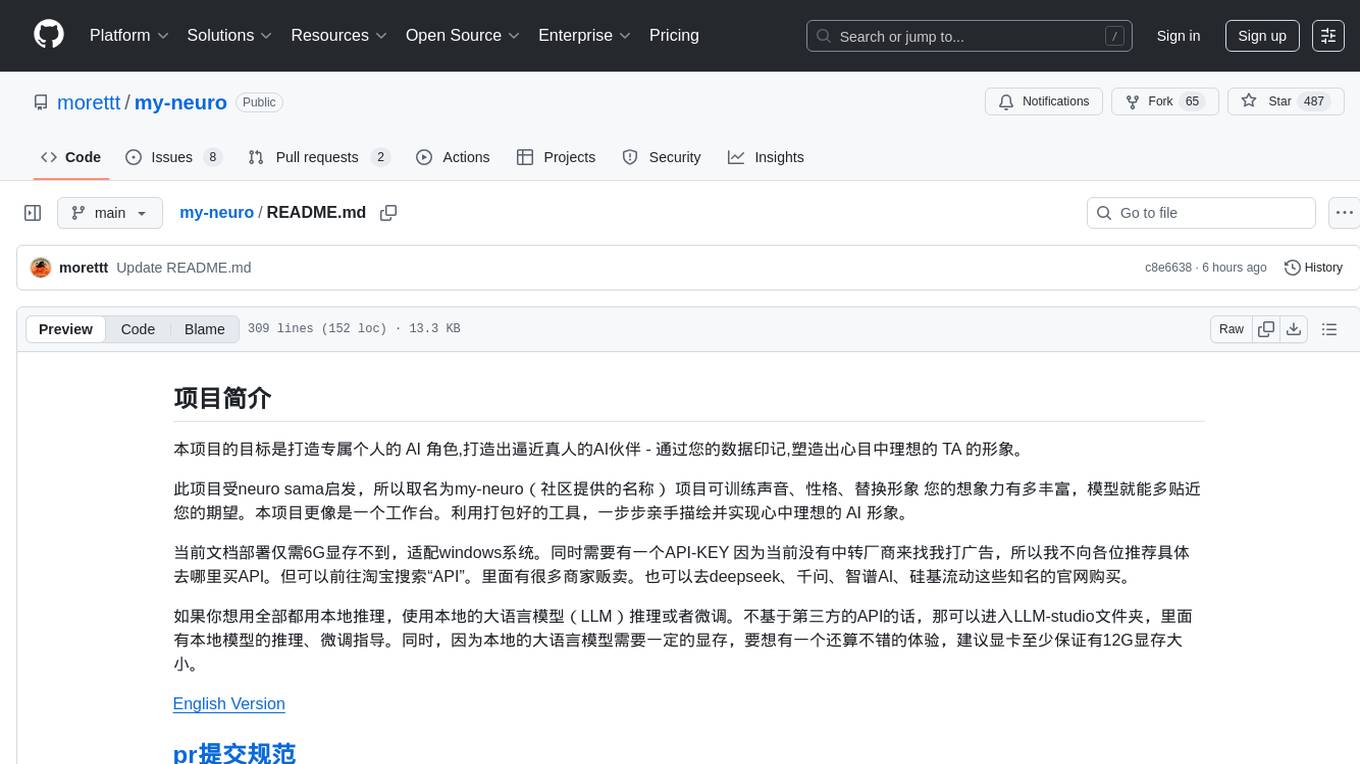
my-neuro
The project aims to create a personalized AI character, a lifelike AI companion - shaping the ideal image of TA in your mind through your data imprint. The project is inspired by neuro sama, hence named my-neuro. The project can train voice, personality, and replace images. It serves as a workspace where you can use packaged tools to step by step draw and realize the ideal AI image in your mind. The deployment of the current document requires less than 6GB of VRAM, compatible with Windows systems, and requires an API-KEY. The project offers features like low latency, real-time interruption, emotion simulation, visual capabilities integration, voice model training support, desktop control, live streaming on platforms like Bilibili, and more. It aims to provide a comprehensive AI experience with features like long-term memory, AI customization, and emotional interactions.
For similar jobs

sweep
Sweep is an AI junior developer that turns bugs and feature requests into code changes. It automatically handles developer experience improvements like adding type hints and improving test coverage.

teams-ai
The Teams AI Library is a software development kit (SDK) that helps developers create bots that can interact with Teams and Microsoft 365 applications. It is built on top of the Bot Framework SDK and simplifies the process of developing bots that interact with Teams' artificial intelligence capabilities. The SDK is available for JavaScript/TypeScript, .NET, and Python.

ai-guide
This guide is dedicated to Large Language Models (LLMs) that you can run on your home computer. It assumes your PC is a lower-end, non-gaming setup.

classifai
Supercharge WordPress Content Workflows and Engagement with Artificial Intelligence. Tap into leading cloud-based services like OpenAI, Microsoft Azure AI, Google Gemini and IBM Watson to augment your WordPress-powered websites. Publish content faster while improving SEO performance and increasing audience engagement. ClassifAI integrates Artificial Intelligence and Machine Learning technologies to lighten your workload and eliminate tedious tasks, giving you more time to create original content that matters.

chatbot-ui
Chatbot UI is an open-source AI chat app that allows users to create and deploy their own AI chatbots. It is easy to use and can be customized to fit any need. Chatbot UI is perfect for businesses, developers, and anyone who wants to create a chatbot.

BricksLLM
BricksLLM is a cloud native AI gateway written in Go. Currently, it provides native support for OpenAI, Anthropic, Azure OpenAI and vLLM. BricksLLM aims to provide enterprise level infrastructure that can power any LLM production use cases. Here are some use cases for BricksLLM: * Set LLM usage limits for users on different pricing tiers * Track LLM usage on a per user and per organization basis * Block or redact requests containing PIIs * Improve LLM reliability with failovers, retries and caching * Distribute API keys with rate limits and cost limits for internal development/production use cases * Distribute API keys with rate limits and cost limits for students

uAgents
uAgents is a Python library developed by Fetch.ai that allows for the creation of autonomous AI agents. These agents can perform various tasks on a schedule or take action on various events. uAgents are easy to create and manage, and they are connected to a fast-growing network of other uAgents. They are also secure, with cryptographically secured messages and wallets.

griptape
Griptape is a modular Python framework for building AI-powered applications that securely connect to your enterprise data and APIs. It offers developers the ability to maintain control and flexibility at every step. Griptape's core components include Structures (Agents, Pipelines, and Workflows), Tasks, Tools, Memory (Conversation Memory, Task Memory, and Meta Memory), Drivers (Prompt and Embedding Drivers, Vector Store Drivers, Image Generation Drivers, Image Query Drivers, SQL Drivers, Web Scraper Drivers, and Conversation Memory Drivers), Engines (Query Engines, Extraction Engines, Summary Engines, Image Generation Engines, and Image Query Engines), and additional components (Rulesets, Loaders, Artifacts, Chunkers, and Tokenizers). Griptape enables developers to create AI-powered applications with ease and efficiency.

























